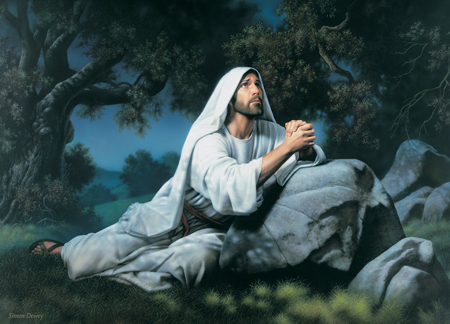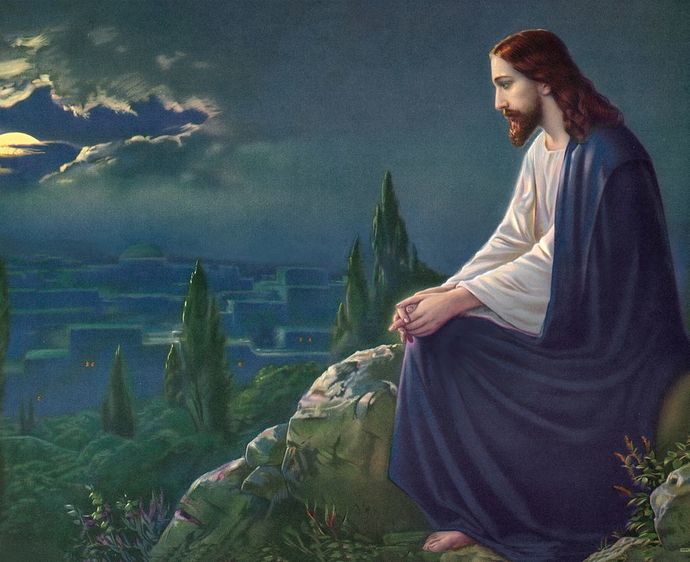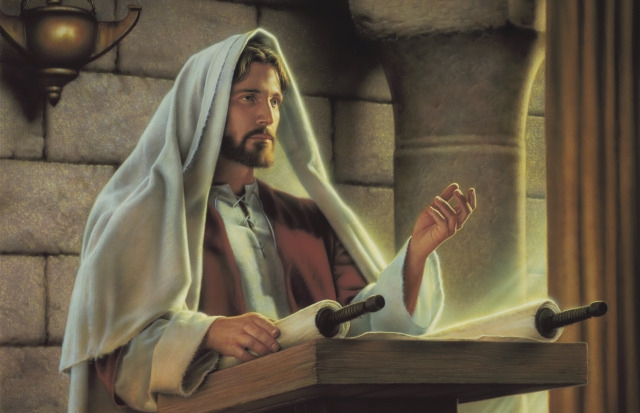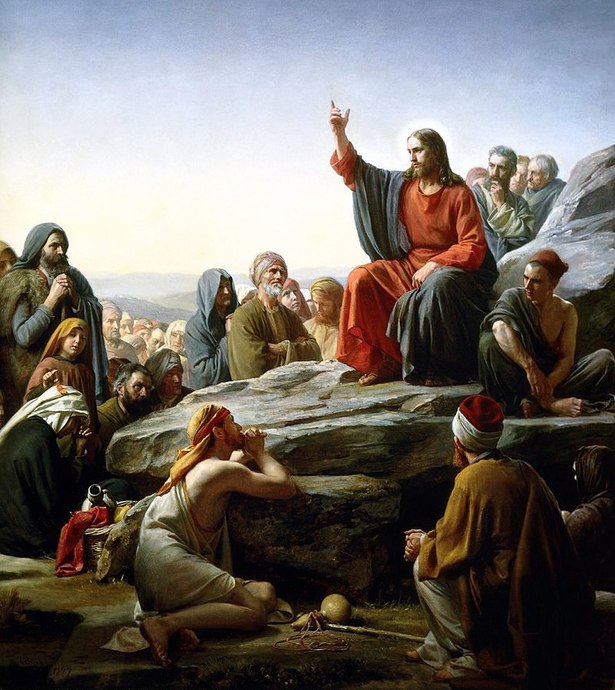One of the fundamental beliefs of Christianity relates that Jesus died and allowed for the shedding of his blood for the sake of granting forgiveness to people. In other words Jesus died on the cross as a sacrifice for our sins. Let us investigate this topic from the Bible, and find out whether Jesus was sent to be crucified and whether he was crucified at all.
Peter and the two sons of Zebedee were with Jesus Christ before the elders of the people and the chief priests came to take him to be crucified. Jesus at this point talked to Peter and the two sons of Zebedee as in Matthew 26:38 “Then saith he unto them, My soul is exceeding sorrowful, even unto death: tarry ye here, and watch with me.”
Then Jesus went a little further away from them and prayed to God as in Matthew 26:39 “And he went a little farther, and fell on his face, and prayed, saying, O my Father, if it be possible, let this cup pass from me: nevertheless not as I will, but as thou wilt.”
It is very clear from the above verse in Matthew 26:39 that Jesus had no intention of dying. In this verse it is shown that Jesus was praying strongly (Matthew mentions Jesus repeating this prayer three times) to have this death removed from him. Had Jesus Christ been sent to be crucified, he would not have hesitated to be killed at all.
When I raise this point in front of my Christian brothers, they tell me that this hesitation came from the flesh side of him (in other words he was tempted), and that his soul which is godly did not have this hesitation at all. When we look at Matthew 26:38 we see that Jesus was contradicting this idea by saying, “My soul is exceeding sorrowful, even unto death.” (Matthew 26:38). He himself said that it’s really his soul that was hesitating and not his body. These were Jesus’ own words.

Jesus was crucified on Friday, this is certainly known among all Christians, and it’s the reason for calling that Friday by “Good Friday.” Jesus was buried on Friday night. Now let us start counting:
1. Friday night Jesus was buried. This is night #1.
2. Saturday day Jesus was still in the grave. This is day #1.
3. Saturday night Jesus was still in the grave. This is night #2.
Mary Magdalene, very early in the morning before sun rise and after the Sabbath (Saturday), went to see Jesus, and found that he was not there. The following verses describe this event:
Mark 16:1 And when the Sabbath was past, Mary Magdalene, and Mary the mother of James, and Salome, had bought sweet spices, that they might come and anoint him.
Mark 16:2 And very early in the morning the first day of the week, they came unto the sepulcher at the rising of the sun.
Mark 16:3 And they said among themselves, Who shall roll us away the stone from the door of the sepulcher?
Mark 16:4 And when they looked, they saw that the stone was rolled away: for it was very great.
Mark 16:5 And entering into the sepulcher, they saw a young man sitting on the right side, clothed in a long white garment; and they were affrighted.
Mark 16:6 And he saith unto them, Be not affrighted: Ye seek Jesus of Nazareth, which was crucified: he is risen; he is not here: behold the place where they laid him.

The number of days and nights Jesus spent in the heart of the earth is 1 day and 2 nights. This challenges what Jesus had prophesied.
When I tell this to my Christian brothers, some of them responded by saying that what Jesus wanted to really say was that he will be gone for a while, and not that he will be in the heart of the earth for three days and three nights. This is clearly not the case. Had Jesus meant that, he would have said it, but it is clear that he wanted people to know this was a sign (miracle) and it will be like Jonas’ sign, and he will be in the heart of the earth for three days and three nights. These were his own words.
Another argument is that the Jews used a different system for the day and night which makes the prophecy come true. The idea says that Jews used to consider a day shorter than we consider it now. If you would ask a Jewish person about their calendar you would find that this is not the case, and a day does not become shorter at all. The difference between a Jewish day and a regular day is the time when the day starts and ends. Jewish people considered the day over when the sun went down, whereas now we consider midnight to be the end of a day. There is no difference in the length of the day, and accepting the Jewish day would only make things worse as far as the prophecy goes.
According to the Christian doctrine, Jesus died on the cross as a sacrifice for our sins. Every human is born with sins, or all humans will eventually sin, and therefore it was necessary that someone as pure as Jesus would be crucified to nullify these sins. The question is; why does anyone have to die for our sins when God, the all merciful, could as easily grant us forgiveness if we asked for it? Why does He have to make someone suffer for our sins or for someone else’s sins? Isn’t that unjust of Him? According to the Bible the way to redemption could be obtained without the need for sacrifice. The Bible says:
Ezekiel 18:20 The soul that sinneth, it shall die. The son shall not bear the iniquity of the father, neither shall the father bear the iniquity of the son: the righteousness of the righteous shall be upon him, and the wickedness of the wicked shall be upon him.
Ezekiel 18:21 But if the wicked will turn from all his sins that he hath committed, and keep all my statutes, and do that which is lawful and right, he shall surely live, he shall not die.
Clearly the soul that sins shall die. Clearly, no one shall bear the iniquity (sins) of others. So Jesus cannot bear the sins of others either. If one is righteous then it shall be upon him, and if one commits a sin then it shall be upon him, and not on Jesus. Finally, the way to repentance and forgiveness is by turning from all sins, doing what is right, and keeping the commandments.
Also we see the same message given by Solomon. He says in the book of Ecclesiastes 12:13 “Let us hear the conclusion of the whole matter: Fear God, and keep his commandments: for this is the whole duty of man.” This is the whole message, and this is the conclusion of messages. It is that one should fear God, keep His commandments, and nothing else.
Again in II Chronicles 7:14 “If my people, which are called by my name, shall humble themselves, and pray, and seek my face, and turn from their wicked ways; then will I hear from heaven, and will forgive their sin, and will heal their land.” This clearly states that to seek forgiveness from God we have to humble ourselves, pray, seek God, and turn away from wickedness.
Finally the Bible says in I Samuel 15:22 “And Samuel said, Hath the LORD as great delight in burnt offerings and sacrifices, as in obeying the voice of the LORD? Behold, to obey is better than sacrifice, and to hearken than the fat of rams.”

This clearly states that obeying God is better than sacrifice whether this sacrifice is of objects, animals, or humans, or any other type. What God likes is for us to heed and obey Him, and if that is what God likes then it is not of Him to come later and change His mind and His ways.
Now that we have seen this, Christians say that Jesus has changed some of these laws. Did Jesus come to change laws? Let’s look at what Jesus says. In Matthew 5:17 “Think not that I am come to destroy the law, or the prophets: I am not come to destroy, but to fulfil.” Jesus clearly states that he was not sent to abolish the law, the law of which had already existed. What is mentioned above cannot be discounted.
Then Jesus continues to say, in Matthew 5:18 and 19 “For verily I say unto you, Till heaven and earth pass, one jot or one tittle shall in no wise pass from the law, till all be fulfilled. Whosoever therefore shall break one of these least commandments, and shall teach men so, he shall be called the least in the kingdom of heaven: but whosoever shall do and teach them, the same shall be called great in the kingdom of heaven.” Jesus here asserts that not even as much as a tittle (dot) shall pass from the law. Every thing is kept the way it was. This is why the previous laws cannot be removed or discarded, and those who willfully change these laws “he shall be called the least in the kingdom of heaven.”
In John 10:30 Jesus said, “I and my Father are one.” This verse, according to Christians, shows God and Jesus Christ to be same. On the other hand, we read in John 20:17, “Jesus saith unto her, Touch me not; for I am not yet ascended to my Father: but go to my brethren, and say unto them, I ascend unto my Father, and your Father; and to my God, and your God.”
Here Jesus stated that there was a distinction between him and God. In other words that Jesus himself had a God. Also, Matthew 27:46 “And about the ninth hour Jesus cried with a loud voice, saying, Eli, Eli, lama sabachthani? That is to say, My God, my God, why hast thou forsaken me?” Here Jesus Christ cried in loud voice calling for his God.

These are two different and opposite ways Jesus relates himself to God. The first one, he and God are one, and the second, he refers to a higher authority than him which is God. Now assuming that both are correct statements then we have a contradiction. If, for example, Jesus Christ was God himself as in John 10:30 then it would be more appropriate for him to say “...and to myself, and your God.” in John 20:17, or “Myself, Myself, why hast thou forsaken me?” in Matthew 27:46. If, on the other hand, one of them is wrong and the other is correct then we have to discard the one we believe to be incorrect! Since God does not make mistakes then we no longer believe the Bible is the word of God (because we believe there is a contradiction of God’s words in the Bible).
A third possibility is that we have to look at how we can interpret the words of Jesus in those verses. As far as John 20:17 and Matthew 27:46 it is very clear Jesus had a God whom he prayed to and Whom had a higher authority than his own. We can back this up with other verses from the Bible that say, “I can of mine own self do nothing: as I hear, I judge: and my judgment is just; because I seek not mine own will, but the will of the Father which hath sent me.” (John 5:30). Also Jesus said, “...for my Father is greater than I” (John 14:28). If Jesus and God were the same then he would not have said what he said in the above verses.
Now, the only verse that can be interpreted is John 10:30. It is the only one that does not render itself clear. The only way John 10:30 could be interpreted such that it does not contradict all the other verses is by saying that Jesus meant he and God had something in common.
To find out what the common grounds were, we have to look at the context in which this verse came:
John 10:27 My sheep hear my voice, and I know them, and they follow me:
John 10:28 And I give unto them eternal life; and they shall never perish, neither shall any man pluck them out of my hand.
John 10:29 My Father, which gave them me, is greater than all; and no man is able to pluck them out of my Father’s hand.
John 10:30 I and my Father are one.

As can be seen from John 10:28 and John 10:29 Jesus was telling the Jews that he and God share something in common, and it was: no one can pluck the faithful from either of their hands. This was the common factor between Jesus and God in this case, and not that Jesus was himself God, or that they were exactly the same.
Let us go on to see what Jesus says in John 10:
John 10:31 Then the Jews took up stones again to stone him.
John 10:32 Jesus answered them, Many good works have I showed you from my Father; for which of those works do ye stone me?
John 10:33 The Jews answered him, saying, For a good work we stone thee not; but for blasphemy; and because that thou, being a man, makest thyself God.
John 10:34 Jesus answered them, Is it not written in your law, I said, Ye are gods?
John 10:35 If he called them gods, unto whom the word of God came, and the scripture cannot be broken;
John 10:36 Say ye of him, whom the Father hath sanctified, and sent into the world, Thou blasphemest; because I said, I am the Son of God?
John 10:37 If I do not the works of my Father, believe me not.
John 10:38 But if I do, though ye believe not me, believe the works: that ye may know, and believe, that the Father is in me, and I in him.
John 10:39 Therefore they sought again to take him: but he escaped out of their hand,
John 10:40 And went away again beyond Jordan…
In John 10:31 we see that the Jews misunderstood what Jesus had meant by “I and my Father are one.” (John 10:30). And in John 10:33 they accused him of blasphemy. Now, had Jesus been God, or had he and God been one in a literal sense then he wouldn’t have hesitated to clarify the matter at that point. Jesus at that point said, “Is it not written in your law, I said, Ye are gods?” What he was trying to say was that if the Jews called “I and my Father are one” blasphemy then they should call what was written in their law “Ye are gods” blasphemy too.
The reasoning behind this is “Ye are gods” does not mean that you, the Jews, are Gods, it is rather an expression. It just means that you are godly people. The same applies to “I and my Father are one.” It does not mean that Jesus is God or that he and God are the same literally. It’s just an expression. (The same goes for calling himself “the Son of God.” This statement should not be taken literally either).
What About All These Verses?
After I discuss the above with my Christian brothers they ask me, “but what about the other verses that say Jesus is God?” and they show me some of them. Some of these verses are:
• John 8:58 “Jesus said unto them, Verily, verily, I say unto you, Before Abraham was, I am.” My Christian brothers associate this verse to the words God had said to Moses in the Old Testament when He said to him in Exodus 3:14 “And God said unto Moses, I AM THAT I AM: and he said, Thus shalt thou say unto the children of Israel, I AM hath sent me unto you.” What Jesus said is similar to what God said to Moses. Therefore they are the same.
• Matthew 18:20 “For where two or three are gathered together in my name, there am I in the midst of them.” Here Jesus gives himself a divine quality, being present as God.
• Revelation 1:17-18 “And when I saw him, I fell at his feet as dead. And he laid his right hand upon me, saying unto me, Fear not; I am the first and the last: I am he that liveth, and was dead; and, behold, I am alive for evermore, Amen; and have the keys of hell and of death.” Jesus says that he is the first and the last. This is clearly a divine quality. He also says that he has the keys of hell and of death. This is also a divine quality.
I really don’t know how many more verses like these are available, but let us assume that there are more. I reply to them that what they showed me proves my point even further, and before I explain how, I relate the following verse to them:
• Mark 13:32 “But of that day and that hour knoweth no man, no, not the angels which are in heaven, neither the Son, but the Father.” It is shown here that God and only God and not the son (Jesus) has the knowledge of the time of the Judgment day. Jesus here denies his divinity (since God knows everything).
• John 5:19 “Then answered Jesus and said unto them, Verily, verily, I say unto you, The Son can do nothing of himself, but what he seeth the Father do: for what things soever he doeth, these also doeth the Son likewise.” Here Jesus also says that his powers do not belong to him, and he alone, without the help of God, can do nothing. Again Jesus is denying divine qualities.
• John 5:30 “I can of mine own self do nothing: as I hear, I judge: and my judgment is just; because I seek not mine own will, but the will of the Father which hath sent me.” Here Jesus also denies any divine qualities. He (Jesus), without God can do nothing.
• John 20:17 “Jesus saith unto her, Touch me not; for I am not yet ascended to my Father: but go to my brethren, and say unto them, I ascend unto my Father, and your Father; and to my God, and your God.” Also, in Matthew 27:46 “And about the ninth hour Jesus cried with a loud voice, saying, Eli, Eli, lama sabachthani? That is to say, My God, my God, why hast thou forsaken me?” Here Jesus, in the first verse, says that he has a God, and in the second he cries out for his God. Surely God does not have a god. Jesus clearly shows that he has a God and that he is not divine.
• John 5:37 “And the Father himself, which hath sent me, hath borne witness of me. Ye have neither heard his voice at any time, nor seen his shape.” Jesus clearly states that no one had even heard God’s voice, and not even seen His shape. This is Jesus talking, his voice heard, and his shape seen by those he is with at the moment, so it cannot be him that he is referring to as the divine character, and that means that they (Jesus and God) are not the same.
• John 14:28 “Ye have heard how I said unto you, I go away, and come again unto you. If ye loved me, ye would rejoice, because I said, I go unto the Father: for my Father is greater than I.” Here Jesus also says that God is greater than Jesus. Again he is disclaiming divinity.
• Matthew 19:17 “And he said unto him, Why callest thou me good? There is none good but one, that is, God: but if thou wilt enter into life, keep the commandments.” When a man referred to Jesus by good master, Jesus replied to him by saying that there is only one good that is God. If Jesus cannot even claim that he is good, then why should he claim that he is God?
These are all verses from the Bible. Some show Christ to be God or having some qualities of God and others show that he is not God and that he does not have divine qualities. Which should we believe? Aren’t these contradictions? I say to all my Christian brothers that brought me verses that claim Christ’s divinity, “now you have to explain to me how this is possible. What does all this mean?”

 Holidays
Holidays  Girl's Behavior
Girl's Behavior  Guy's Behavior
Guy's Behavior  Flirting
Flirting  Dating
Dating  Relationships
Relationships  Fashion & Beauty
Fashion & Beauty  Health & Fitness
Health & Fitness  Marriage & Weddings
Marriage & Weddings  Shopping & Gifts
Shopping & Gifts  Technology & Internet
Technology & Internet  Break Up & Divorce
Break Up & Divorce  Education & Career
Education & Career  Entertainment & Arts
Entertainment & Arts  Family & Friends
Family & Friends  Food & Beverage
Food & Beverage  Hobbies & Leisure
Hobbies & Leisure  Other
Other  Religion & Spirituality
Religion & Spirituality  Society & Politics
Society & Politics  Sports
Sports  Travel
Travel  Trending & News
Trending & News
Most Helpful Opinions